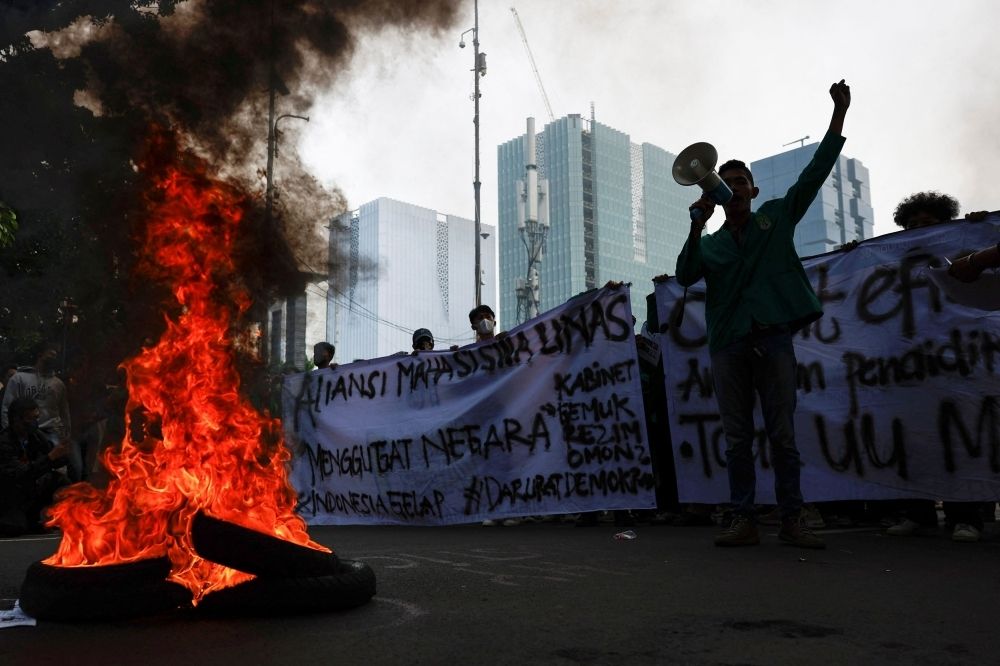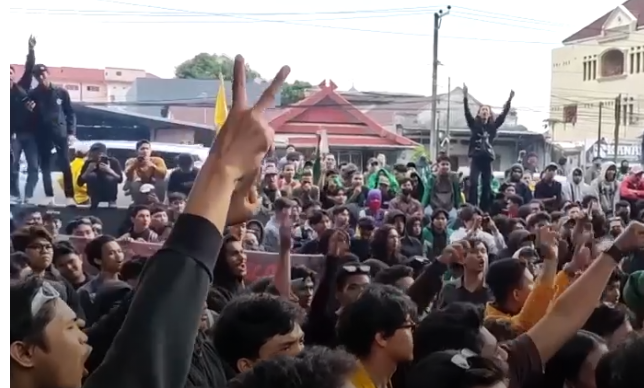Preparing to Face a Fascist Regime From the Power of President Prabowo Subianto As the Successor of New Order
Written by: Indorev on 8 April 2025
(Above: "Dark Indonesia" protest February 2025 Source: https://alkhaleejtoday.co/ )
This document from ICOR affiliate Indorev was written as thousands of students and activists took to the streets in February to protest budget cuts of up to $19 billion announced by Indonesian President Prabowo Subianto. the protests were lainched on Februart 17 by the All-Indonesian Students Union. Australian Communists have a long history of standing with the Indonesian people and will always support their just struggles – eds.
Indorev, 2/16/2025
Fascism is an open terror against the revolutionary movement and the working class movement. In many ways, fascism came to power through democratic means, using the legality of the bourgeoisie. The experience of Indonesian revolutionaries has been that for more than three decades they have been subjected to the open terror of the power that calls itself Suharto's New Order. Mass killings, torture, pursuit, arrests, exile and ostracism, all without recourse to the rule of law, even if only the laws of the bourgeoisie of their own making.
Now that Suharto has stepped down, there is a fierce battle within the bourgeoisie itself, a conflict among the political elite. It is essentially a battle between the old, but still relatively intact forces backed by fascist elements within religious fundamentalist organizations and the emerging bourgeoisie that still retains bourgeois democratic values. And, like every political battle, it is actually a reflection of the economic interests of the struggling parties.
GOLKAR (Golongan Karya), which represents the interests of the big bourgeoisie, which since its birth has practiced fanatically anti-communist politics, and has been one of the pillars of the New Order's power alongside the Armed Forces of the Republic of Indonesia and the fascist bureaucrats, and now pretends to be a “democratic” and “anti KKN” (Corruption, Collusion, Nepotism) party, cleverly uses the legality of bourgeois democracy to regain power for itself. It is as
if people are being forced to forget their past as the main supporters of the fascist New Order, which practiced corruption from head to toe.
Although there have been five presidential changes since Suharto's death, President Prabowo Subianto, who was elected as the eighth president to replace Joko Widodo who came from the military, has been a faithful successor to Suharto's New Order rule supported by Gerindra, the main party he founded, GOLKAR, and other bourgeoisie parties.
Prabowo, who was once Suharto's son-in-law, has a checkered human rights record as commander of a unit that abducted and tortured several democracy campaigners towards the end of the Suharto regime in the late 1990s. Of the 23, some survived, one died, and 13 activists are still missing. He was later removed from the military and exiled to Jordan in the 2000s. Surprisingly, when Joko Widodo was president, he gave a 4-star honorary general title to Prabowo Subianto when he was defense minister.
President Prabowo owns a number of companies in the coal mining sector in Kalimantan, such as PT Nusantara Energy, PT Nusantara Kaltim Coal, PT Erabara Persada, and PT Nusantara Energindo Coal with a total area of 45,703 hectares. Meanwhile, Vice President Gibran Rakabuming Raka has a mining network through his father's company, PT Rakabu Sejahtera, affiliated with PT Toba Sejahtera owned by Luhut Binsar Panjaitan. The company is also affiliated with Gibran's family, ranging from younger siblings, older cousins, to uncles.
In addition, Prabowo also emphasized that he was not only the successor of the New Order but also continued the program to maintain the Omnibus Law policy which was very pro-capitalist while harming the working class. This is done to smoothen the interests of foreign and domestic investment. One of the business sectors that received a red carpet from this omnibus law was the mining sector, with the imposition of 0% royalty for business actors. It is no wonder that this omnibus law is considered a recipe book for the structured and systematic looting of natural resources.
The impact of the implementation of this Omnibus Law is environmental damage. More than that is the escalation of agrarian conflicts. The highest cases of agrarian conflict come from the plantation, infrastructure, property, mining, forestry, military facilities, agriculture/agribusiness, and coastal and small islands sectors. The end of this conflict is of course acts of violence by corporations and state violence apparatus.
From the 100 days of Prabowo Subianto's administration, militarism has strengthened, civilian supremacy has weakened, and democracy is on the brink. The Prabowo administration has rolled out the red carpet to the military, but it has also inherited a democracy that has been weakened by the Joko Widodo administration.
During the first three months of his administration, prabowo redeployed the army into many State affairs. The deployment of the military to work on food barns is one of them. Other examples: the control of forest areas, free nutritious meals, and the organization of the Hajj. These tasks are not included in military operations other than war as stated in the Indonesian national army law.
In the next five years, the military will gain even more grip. The defense ministry plans to increase military regional commands from 15 to 37 by 2029. Every year for five years, the government will also add 100 territorial infantry battalions to accelerate development. Each battalion will have a company that takes care of livestock, fisheries, agriculture and health. As if that wasn't enough, the battalions, which will be under the command of military districts, will receive reinforcements from two battalions of reserve components recruited from civil society.
The formation of these battalions will be overseen by each major command commander. This battalion will be different from the existing battalion. The current battalion only consists of one battalion headquarters, one headquarters company, one support company, and three rifle companies. Meanwhile, the 100 battalion will be supported by an agricultural company, a livestock company, a health company and a construction company. Each unit will be equipped with modern equipment and materials. One battalion usually has 500-1000 soldiers. In addition, the formation of 100 battalions will encourage TNI to return to business. The most likely business is the security business and the security business as a guard dog for the capitalist class. This TNI territorial network will become Prabowo's political stronghold both to reduce the opposition and suppress the revolutionary movement.
The strengthening of militarism will be even more unstoppable if the government and the House of Representatives amend the TNI (Indonesian National Army) law, the revised draft of which is already on the list of the national legislation program. With active soldiers free to enter civilian positions, the military is increasingly exerting its influence in various fields and, conversely, civil society is standing on the sidelines. In 2023, there were 2,569 active TNI soldiers in civilian positions. This is in addition to 29 active officers occupying civilian positions outside the institutions stipulated in the TNI law. This military dominance risks reopening the militaristic approach to solving state problems and will pave the way for the creation of authoritarianism in a new form. In addition, mass organizations originating from thug groups began to be given legality and financed to hit the people's movement and pro-democracy activists.
(Above: "Dark Indonesia" rally February 20, 2025)
With a battered democracy, which is much weaker than the first time Jokowi became president, Prabowo immediately consolidated his power to gather parties and political elites to support his government when he was sworn in as president. Without the power of the opposition, authoritarianism can no longer be curbed.
The centralization of economic, technological and financial power in Indonesia can be explained by the fact that decisions, regulations, legislation, are essentially not in the interests of the people, but in the interests of the rulers and businessmen: the capitalist bureaucrats.
The pillars supporting the socio-economic costs for the growth of these capitalist groups, such as in the fields of education, health, environment, transmigration, and urban development, as well as the areas needed for the geographical concentration of industry, must be borne by the sweat, tears, and blood of the people, on behalf of the State so that the corporate machine continues to move for more value, for profits robbed from the working people: workers, peasants and fishermen.
And, in Indonesia, it's even worse. Representative institutions, like all other institutions, have become hotbeds of corruption! It is a waste of time trying to get into representative institutions, including curing the diseases of the bourgeoisie in them. Why, because the decision-making process is bound to be in the interests of the capitalists, and these decisions, especially in the field of industrial production, will not prioritize the needs of the masses of people.
Looking at the facts, the current “democracy” and “reform” in representative institutions and government is poison. Because democracy is like a piece of money, it has two sides, one is democracy, the other side is dictatorship. Learning from the ancient Greek era with the slavery system, democracy is a slave owner, for slave masters. Democracy only applies to slave masters, while for slaves, they are the dictators: slaves are the same as cattle, work, give birth, can be sold, and can be killed. In the days of the feudal system, democracy only applied to kings and nobles. As for the people, the kings and nobles of the dictatorship could seize the property rights of the people, even though they were no longer sold or killed. In the current capitalist system, democracy only applies to the owners of capital, they the capitalists are the dictators of the working people in the fields of production and distribution. The capitalist system is a system of trade. The dictators are the capitalists who control trade. Thus, the working people become merchandise.
Therefore, talking about representative democracy, electoral politics, general elections, regional head elections are of no use. Unless, we talk about People's Democracy, true democracy for all the people, and dictatorship in the hands of the people, the working people who determine, end and finish the system of capitalism in Indonesia today.
Print Version - new window Email article
-----
Go back
Independence from Imperialism
People's Rights & Liberties
Community and Environment
Marxism Today
International
Articles
| Preparing to Face a Fascist Regime From the Power of President Prabowo Subianto As the Successor of New Order |
| ICOR call for International Women's Day 2025 |
| Richard Boyle case vindictive and intimidatory |
| Adelaide Survival Day: with the masses and against the masses. |
| Melbourne rallies around Invasion Day solidarity |
| Survival Day demands decolonisation |
| Civil defence a threat to civil liberties? Well, in a word, Yes. |
| A Tale of Two Pities |
| Remain firmly opposed to Zionism, anti-Semitism and all forms of racism |
| The reactionaries must condemn all terrorism, including their own |
| Media and CFMEU Administrators threaten rank and file fightback |
| Dare to struggle, dare to win against Administrator: CFMEU Sydney Rally |
| Richard Boyle: Hero not Criminal |
| Unionists In SA Celebrate 140 Year Anniversary of United Trades and Labour Council |
| Building industry and parliamentary squabble over how best to exploit construction workers |
| Defending the CFMEU in SA |
| Murdoch media’s blindness and indifference to the far-right |
| Freedom for Georges Abdallah! |
| Attacks on Greens MP reveal ruling class distortions and weakness |
| Sacking of CFMEU rank and file reps a wake-up call for all workers |
-----


